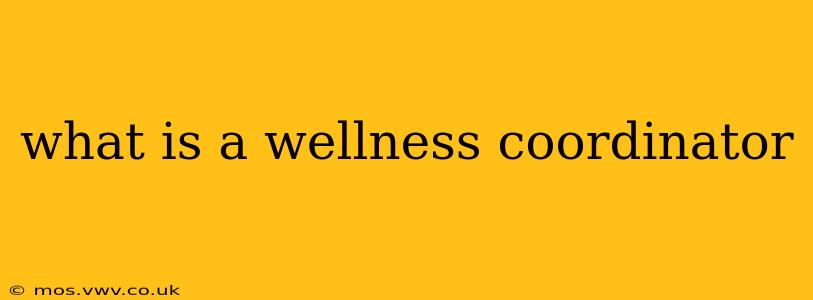A wellness coordinator is a professional dedicated to improving the health and well-being of individuals or groups within a specific setting. This could be a workplace, a school, a healthcare facility, or even a community organization. Their role is multifaceted, encompassing education, program development, and implementation to foster a culture of health and wellness. Think of them as the architect of a healthier environment, designing and delivering initiatives that promote physical, mental, and emotional well-being.
What does a wellness coordinator do?
The daily tasks of a wellness coordinator vary depending on their workplace and the specific needs of their population. However, some common responsibilities include:
- Developing and implementing wellness programs: This involves researching, planning, and executing initiatives designed to address specific health concerns or promote healthy behaviors. Examples include weight management programs, stress reduction workshops, ergonomic assessments, or smoking cessation support.
- Educating employees/members/students: Wellness coordinators often deliver educational presentations, workshops, and training sessions on topics like nutrition, fitness, stress management, and disease prevention. They may also create and distribute informative materials like newsletters, brochures, or online resources.
- Promoting healthy behaviors: This involves creating a supportive environment that encourages healthy choices. This can include organizing health fairs, promoting physical activity through challenges or incentives, and providing access to resources like healthy food options or fitness facilities.
- Tracking and evaluating program effectiveness: Wellness coordinators monitor participation rates, collect data on program outcomes, and analyze results to measure the success of their initiatives and make adjustments as needed. This data-driven approach ensures programs remain relevant and effective.
- Collaborating with other professionals: They frequently work with healthcare providers, human resources staff, and other stakeholders to integrate wellness initiatives into existing programs and services.
- Managing budgets and resources: Depending on the setting, wellness coordinators may be responsible for managing budgets, securing funding, and overseeing the procurement of necessary materials and equipment.
What are the required skills and qualifications of a Wellness Coordinator?
While specific requirements vary, many employers seek candidates with:
- Bachelor's degree: A degree in health education, public health, kinesiology, or a related field is often preferred.
- Experience in health promotion or wellness: Prior experience developing and implementing wellness programs is highly valued.
- Strong communication and interpersonal skills: The ability to effectively communicate with diverse populations and build rapport is crucial.
- Organizational and planning skills: Wellness coordinators must be able to manage multiple projects and prioritize tasks effectively.
- Knowledge of health and wellness principles: A solid understanding of health and wellness concepts, including nutrition, exercise, stress management, and disease prevention, is essential.
- Proficiency in data analysis and reporting: The ability to track program outcomes, analyze data, and prepare reports is important for demonstrating program effectiveness.
What are the different types of wellness coordinators?
The specific title and responsibilities of a wellness coordinator can vary widely depending on the industry. Some examples include:
- Corporate Wellness Coordinator: Focuses on improving the health and well-being of employees within a company.
- School Wellness Coordinator: Works to promote the health and well-being of students and staff in an educational setting.
- Healthcare Wellness Coordinator: Supports patients and their families in managing their health and well-being within a clinical setting.
- Community Wellness Coordinator: Works to improve the health and well-being of individuals and communities through outreach programs and initiatives.
What is the difference between a Wellness Coordinator and a Health Coach?
While both roles focus on promoting well-being, there are key distinctions. A wellness coordinator typically works with groups and implements broader organizational initiatives. They design programs and create a supportive environment. A health coach, on the other hand, usually works one-on-one with clients, providing personalized guidance and support to help them achieve specific health goals. The coach's focus is more individual and behavioral, while the coordinator's is systemic and organizational.
What is the career outlook for a Wellness Coordinator?
The demand for wellness coordinators is growing as organizations increasingly recognize the importance of employee and community well-being. The career outlook is generally positive, with opportunities available across various sectors. The specific salary depends on factors such as experience, education, and location.
This comprehensive overview should provide a thorough understanding of the role of a wellness coordinator. Remember to research specific job descriptions for detailed requirements and responsibilities.
